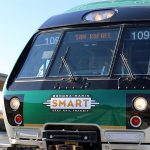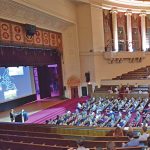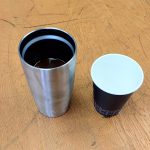Welcome to Monitor Notes, a weekly roundup of news items, event announcements, and updates on past Bay Area Monitor articles.
Now Arriving at the Station
 SMART trains will begin running from the downtown Novato and Larkspur stations this Saturday. To celebrate the opening of the long-awaited Larkspur station — envisioned as a key link for whisking commuters and tourists via the Golden Gate Ferry — SMART will hold a ribbon-cutting ceremony on Friday, December 13 at 1 p.m. The next day, the City of Novato will celebrate its downtown station at 10:30 a.m. Transfer via this link for the temporary schedule through December’s end and this link for timetables effective January 1. The Larkspur addition marks the first new track to the 43-mile line since SMART launched in August of 2017. However, the rail operator faces headwinds. Its board approved plans to put a sales-tax extension measure on the March ballot. Advocates are hoping transit officials will conduct a regional rail update to better coordinate services for SMART and all the other Bay Area operators.
SMART trains will begin running from the downtown Novato and Larkspur stations this Saturday. To celebrate the opening of the long-awaited Larkspur station — envisioned as a key link for whisking commuters and tourists via the Golden Gate Ferry — SMART will hold a ribbon-cutting ceremony on Friday, December 13 at 1 p.m. The next day, the City of Novato will celebrate its downtown station at 10:30 a.m. Transfer via this link for the temporary schedule through December’s end and this link for timetables effective January 1. The Larkspur addition marks the first new track to the 43-mile line since SMART launched in August of 2017. However, the rail operator faces headwinds. Its board approved plans to put a sales-tax extension measure on the March ballot. Advocates are hoping transit officials will conduct a regional rail update to better coordinate services for SMART and all the other Bay Area operators.
Housing Plan Ahead

The county and cities of Santa Clara are updating their five‐year consolidated plan and need community feedback via an online survey to help prioritize investments. The plan, a HUD requirement, pinpoints housing and community improvement needs and how federal funding will be used to address them. Local jurisdictions also are required to prepare an assessment of fair housing, which examines barriers people face in getting and keeping housing as well as measures to break those barriers down. The survey is open through December 20. There are also related meetings tonight and tomorrow in Gilroy and Sunnyvale, respectively, if you’d like more information. Click here for the survey link and meeting details.
Shedding Light on Watersheds

Monitor reporters Robin Meadows and Aleta George attended the 2019 State of the Estuary Conference in Oakland this fall and have shared insights gained in the latest issue of ESTUARY News. Robin wrote about homeless volunteers helping to purge refuse in the Russian River Watershed, an approach the state Water Resources Control Board sees as a model for the rest of California. In another article, Robin reported on new Chinook salmon spawning data that could change the way salmon are managed in the Central Valley. Aleta, meanwhile, explained work being done to improve water quality and wildlife habitat from the polluted black water that emanates from the managed wetlands of duck clubs.
Coffee Talk

Oakland-based Blue Bottle Coffee is brewing a plan to make its U.S. cafés zero-waste by the end of 2020. To sweeten the transition, it will pilot a zero-single-use-cup café in the Bay Area. That means coffee drinkers bring their own mug, or use one of Blue Bottle’s for a small deposit. Some customers may see cup conversions as a grind, but it’s likely to affect the way many take their coffee going forward. Blue Bottle joins other local coffee shops ditching disposable cups, a trend started by the City of Berkeley, which established a 25-cent cup fee that goes into effect January 1, according to the San Francisco Chronicle. Blue Bottle previously switched to compostable bioplastic cups and straws, but those were still ending up in landfills, said CEO Bryan Meehan in a statement. It also tried paper straws and sugarcane-paper cups. “But that’s still not enough,” said Meehan. Blue Bottle goes through an average 15,000 disposable single-use cups per café every month in the U.S.
Monitor Notes is produced by Cecily O’Connor. To receive it by email, scroll to the bottom of this page, enter your email address in the box under “RECEIVE EMAIL UPDATES,” and click the red “SIGN UP” button.